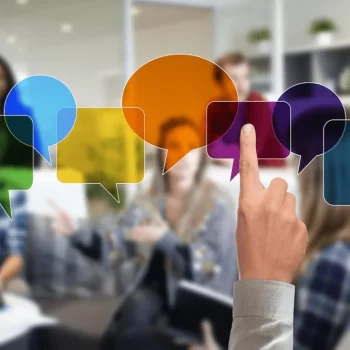It is no secret that today’s customer service industry is one of the most challenging and demanding environments to work in. Day in and day out, customer service representatives are required to deal with demanding customers, handle complaints, and provide solutions to problems. It can be a thankless job at times, but it is also one of the most critical roles in any business. The reality is that satisfied customers are the lifeblood of any successful company. They are the ones who will come back time and time again, and they are also the ones who will refer others to the business. That is why it is so essential to provide excellent customer service.
The customer service industry relies on excellent communication, i.e., not only language skills but also how you express yourself. One of the most critical aspects of providing superior customer service is using the right language. The words that customer service representatives use can significantly impact the customer experience. That is why it is crucial to move away from the trite and oft-repeated phrases. One such example is “happy to help.” On the face of it, using the phrase comes across as sincere and with a willingness to help. However, it can also come across as insincere or even condescending. These words seem to have lost their charm, and customers have begun to tire of hearing them.
Moreover, customers have started to feel that the agents have been trained to repeat the phrase. It feels as though they are now doing it by rote, mechanically, and with a lack of originality. And the representatives appear to have forgotten the meaning and intention behind “happy to help”.
It is time to change it up by using words that sound sincere for both the customer and the customer service representative. There are many different alternatives to these words, which can make the customer service representative sound sincere and convey a genuine willingness to help. We will talk about a few phrases that can enhance the customer experience and make the customer service staff sound more human and empathetic.
First, why doesn’t the phrase ‘happy to help’ work well anymore?
The meaning behind “Happy to help” and reasons to use alternative phrases
What does happy to help mean? Could it imply that you are glad they are having a problem? Could it be that you are trivializing their problem? Customers are reaching out because they are unable to fix issues or need experienced assistance. They are already under enough stress, and they expect a more genuine response when they call. What will be more reassuring is when they understand that you are willing and committed to helping them. The word ‘happy’ doesn’t sound appropriate in this context, does it?
The primary reason to avoid using a standard phrase is that you want to sound human and not like a chatbot. You also want to let the customer know that you acknowledge their problem and you are capable of providing the necessary support. But are there any alternative yet appropriate phrases in this context? Let’s find out.
Related Articles: How To Respond To An Angry Customer
Alternatives to “happy to help.”
Try using a phrase that acknowledges the customer’s issue and shows that you’re ready to assist them. You could say, “I’m sorry to hear you’re having trouble. I’m sure we can help you out,” or “I am sorry that it is causing you problems. Let me see how I can assist you.” These words show that you empathize with the customer and are ready to provide them with the needed assistance.

Remember that customer service is all about engaging with the customer to create a positive experience. Using the right language and tone, you can ensure that the customers are valued and appreciated. A simple “thank you for calling” and offering to help will resonate with customers who need support.
Other phrases that you could use include:
- “I am here to help.” While it is a slight change from “happy to help”, it assures the customer of your availability and willingness to help.
- “I am glad to be of service” is another phrase that will serve you well if you are engaging in a slightly more formal conversation.
- You could use words like assist instead of help every now and then. For instance, “I’d be more than willing to assist”, or “How may I assist you today”?
- Using words like “certainly” or “not a problem” are excellent alternatives.
It is essential that you leave the customer on a positive note. Try ending the conversation with phrases like, “I’m glad we could help you today”, and “Don’t hesitate to reach out. We’re here for you.”

How to stop saying “happy to help.”
If you have been using the exact phrase “happy to help”, it may be a challenge to change it to something else. But, it can be done. To start with, you could write it down and keep it with you when you are taking calls. Even post-its on the desktop can act as reminders. While the initial attempts may sound a tad contrived, you will soon get into the habit.
As a team leader, you could train the customer support representatives with a few role-play sessions until they get into the habit of using alternate phrases. The intention behind the service must be conveyed to the customer at the root of it all. All customer support agents in any industry must be made aware that while the customer may not always be right, they need to be served with respect and courtesy. You can ensure that your agents attempt to make every exchange meaningful and not merely a tactic to retain them.
Some common questions that will come up include specific alternative phrases, which words or phrases are formal or casual, which are conversational and friendly, or a list of terms that will convey the intention to provide support and service. For instance, how do you say “glad to assist” without making it sound abrupt? You could try using them as part of a longer sentence. Try, “I’m glad to be of service”, or “I’m here to assist you with your problem.” It is often confusing to customer service representatives when you tell them to use a casual turn of phrase.
How would you differentiate between casual and formal? After all, any expression can be used in a formal tone. Is “happy to help” formal? Not necessarily. However, it can be abrupt and give the customer the impression that you want to quickly move on to the problem. Rushing a customer is never a good sign because it is bound to increase their stress levels, sensing impatience in the representative. Therefore, you could temper such short phrases by adding a few more words. “Thanks for reaching out. I would be happy to help in any way possible” to give the customer a few extra seconds to bring up the problem calmly.
Related Articles: Customer Support Vs Customer Service: What’s the Difference?
Final thoughts
Customer support is vital to every industry and is the pillar that holds businesses together and helps them succeed. The fundamental principle behind customer support is to offer a niche service that helps resolve issues that come up, ensuring 100% customer satisfaction. Therefore, the role of a customer support representative is not merely to mouth the words but to mean them sincerely. Learning how to express the offer of support is a big part of their role and articulating the expression with phrases that leave the customer feeling valued is vital.
Your customers will know that the offer of help is genuine, and even if the attempt did not resolve their issue and needed to be escalated, they will still have been served to the best of your ability. Customers will feel assured that you will find the help they need. The relationship between the customer and the customer support representative becomes more meaningful than merely transactional. That is the true hallmark of a successful customer support team in any organization.





















